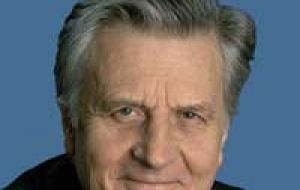MercoPress. South Atlantic News Agency
Euro slides beneath 1.50 US dollars as economy weakens
 Trichet suggests no further interest rate hikes in the near future
Trichet suggests no further interest rate hikes in the near future The Euro slid beneath the 1.50 US dollar Monday to 1.4966 amid concern over the Euro zone economic outlook and confidence that the European Central Bank won't raise interest rates anytime soon.
Last week the European Central Bank and the Bank of England left their key interest rates unchanged at 4.25% and 5% respectively, admitting that growth has become a more pressing issue than inflation. ECB President Jean-Claude Trichet signaled that, with weak economic growth expected in the second and third quarters, an interest rate increase to counter inflation would probably not be forthcoming. Higher interest rates can support a currency, as investors transfer assets where they can get better yields, while lower interest rates can weaken a currency. After Trichet comments last week, markets are starting to bet on a rate cut early next year. Analysts believe that if Euro zone economic figures fall short of expectations, the Euro will fall further toward 1.48 US dollars. The British pound also was lower against the dollar, declining to 1.9163 US dollar from 1.9198. The dollar was lower against the Japanese currency, sliding to 109.90 yen from Friday's level of 110.24 yen, which was its lowest level against the dollar since January. On the political arena ECB is coming under a lot of pressure from EU leaders and politicians unhappy with the way it is setting monetary policy, particularly with the slowing of the economy. Furthermore some commentators point out to the fact that ECB has acted differently in the past year from what happened during the first eight years of its existence. Even when Euro zone growth has fallen to a sub-par pace of about 1% in the first half of the year and there remains considerable stress in the financial system, the ECB nevertheless raised interest rates at its July meeting after a year of policy stability. Last July with inflation hitting 4% ECB hiked the basic interest rate to 4.25%, something which had never happened when growth has been less than 2%. Since then the outlook has further deteriorated with the economy virtually stagnant and at risk of recession. However a slowing down of the economy could also have a positive side effect on EU domestically generated inflation which could then lead in the coming months to a decisive easing of ECB policy. To support this some analysts point out to the fact that from spring 2001 to mid-2003 the ECB eased 275 basis points against the backdrop of GDP annual growth averaging 0.6% in spite of inflation well above target.




Top Comments
Disclaimer & comment rulesCommenting for this story is now closed.
If you have a Facebook account, become a fan and comment on our Facebook Page!